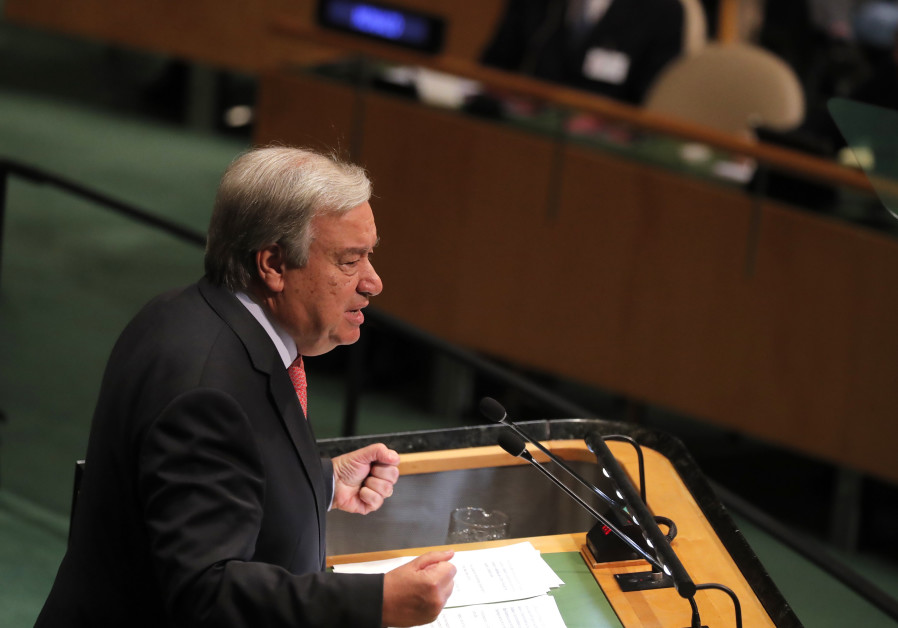Prime Minister Benjamin Netanyahu declined UNESCO’s invitation to attend the event.

Attempts to delegitimize Israel is a form of antisemitism, United Nations Secretary-General Antonio Guterres said on Wednesday at a high level forum to combat hatred against Jews that was held on the sidelines of the General Assembly.
Modern antisemitism, the UN leader said, expressed “itself in attempts to delegitimize the right of Israel to exist, including calls for its destruction, using the pretext of the situation in the Middle East to target Jews and Jewish symbols.”
“The world is also seeing an alarming proliferation of neo-Nazi and white supremacy groups, and of those seeking religious and ethnic domination.
“This is tribalism run amok. Not only are their vile views coming into the mainstream, but the mainstream unfortunately, sometimes, is coming to them,” Guterres said at the event hosted by UNESCO.
Since taking office last year, UNESCO director-general Audrey Azoulay has highlighted the importance of combating antisemitism and Wednesday’s event was part of that effort.
Prime Minister Benjamin Netanyahu declined UNESCO’s invitation to attend the event, stating that the organization’s treatment of the state of Israel was tantamount to antisemitism.
A video of the event, showed an empty chair next to the a sign that said Israel, while foreign ministers and ambassadors from other countries sat in attendance and spoke out on the topic.
But at the UNESCO event Guterres said that the United Nations has a special obligation to fight antisemitism because the organization, was created in the aftermath of World War II to help prevent tragedies like the Holocaust.
“The origins of the United Nations itself are rooted in the need to learn the lessons of the Holocaust. Being true to our Charter means combatting antisemitism and hatred with all our energy and will,” Guterres said.
Azoulay said misinformation around the Israeli-Palestinian conflict has also helped foster contemporary antisemitism.
She added that, antisemitism “undermines fundamental human rights in general, rots and corrupts the whole society. It is one of the most powerful and centuries old ideological forces of violent extremism.”
Such hatred cannot be combated solely by Jewish institutions, Azoulay said. “It is crucial that the entire international community mobilize. Albert Einstein once said it is harder to crack prejudice than an atom. Education, which is at the heart of UNESCO’s mandate is a powerful factor to crack such prejudice,” Azoulay said.
“Jews continue to be attacked for no other reason than their identity,” he said. Antisemitism is “on the rise in all parts of the world where Jewish communities live. But it is also present in countries where there are no Jews at all,” Guterres said.
“Antisemitism has survived across the millennium but should have no place in the 21st century,” Guterres.
Foreign Ministers from Australia, Hungary and Bulgaria spoke at the event as did representatives from the United Kingdom, Sprain, Mexico and Argentina.
Separately, Israel’s Mission to the UN in New York, headed by Ambassador Danny Danon, set up a pavilion on the sidelines of the UN on antisemitism.
It asked UNGA participants to issue statements against antisemitism and to pose with campaign signs that stated, “#No2Antisemitism.
Among those who stopped by were representatives from Brazil, Bulgaria, Albania, Poland and Lithuania.
“This is a great opportunity for the world’s leaders to let their people know that Antisemitism has no place in their country or the world. Incidents in which we see Jewish graves desecrated, the spreading of BDS on college campuses, and calls for the destruction of Israel proves that Antisemitism can take many forms, but is fueled by hatred of the Jewish people. Our campaign is an effort to utilize social media to push back against this age-old bigotry,” Danon said.
According to the Foreign Ministry there were 180,000 antisemitic items posted on the internet and social media in 2018.
It added that from 1989 to 2017, there were 11,183 violent antisemitic incidents around the world.
As reported by The Jerusalem Post
